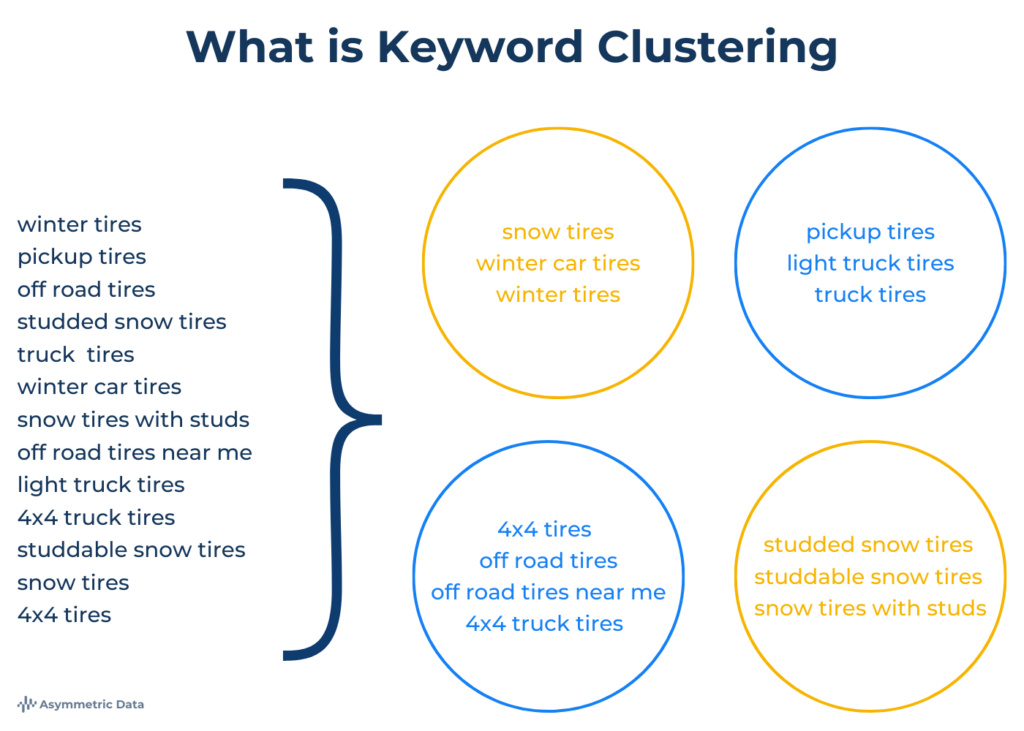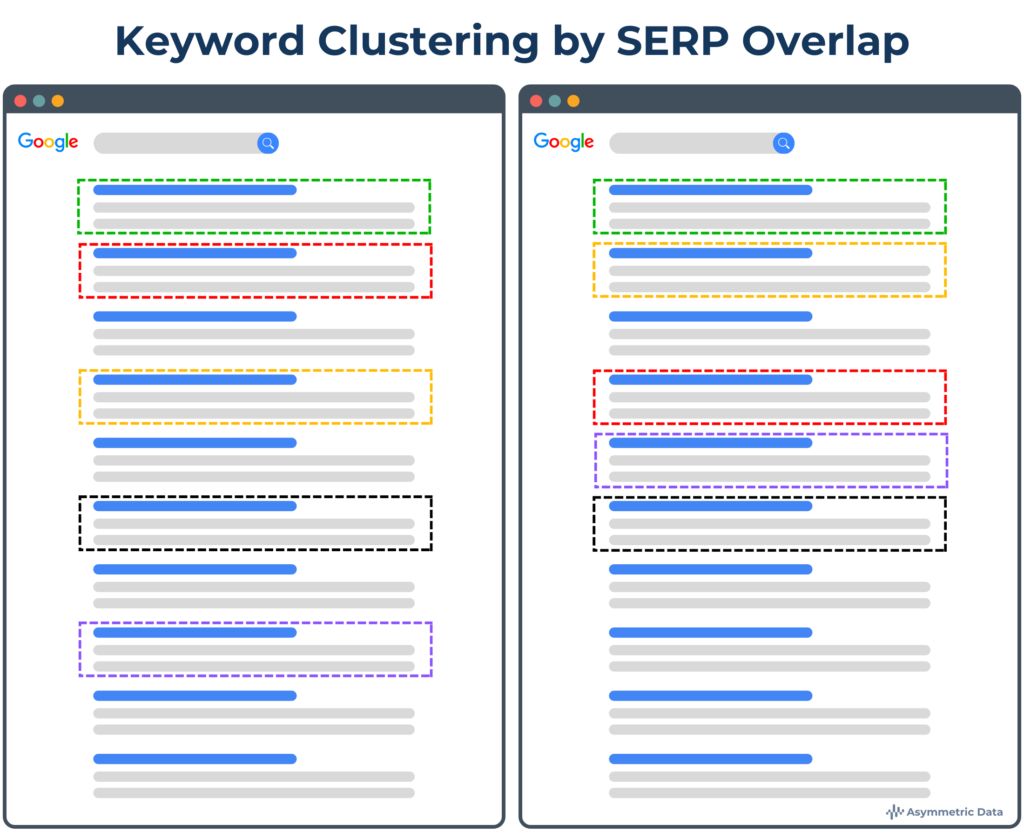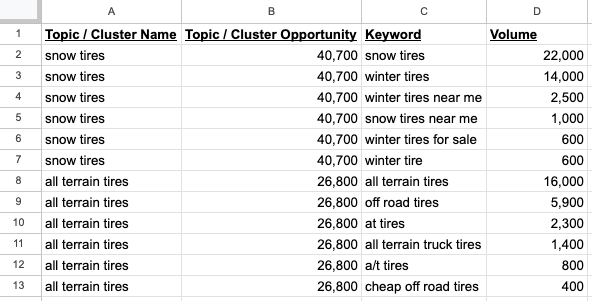Key Takeaways
- Clustering keywords is grouping (clustering) keywords together into groups of words that mean the same thing – helping SEOs to focus on topics, not individual keywords
- Using keyword clustering to plan a content strategy helps you to turn a list of keywords into a content strategy
- The SERP overlap method of keyword clustering is most effective for SEO and compares the URLs ranking for different keywords and groups them together when they share common URLs
What is Keyword Clustering?
Keyword clustering is the process of grouping keywords that mean the same thing together so that they can be targeted in a single piece of content for SEO.
This is a critical part of a search driven content marketing strategy, particularly for site’s doing large scale content marketing. The first step is to do keyword research to compile a list of keywords that you’d like to rank for. Keyword clustering is the part of the process that translates a large list of keywords into a list of content.

Why Does Keyword Clustering Matter?
Keyword clustering is vital to a search driven content marketing strategy as it is what turns the data into action. Clustering helps you determine what content to create in order to effectively target keywords.
The introduction of keyword clusters into an SEO driven content creation strategy is reflective of the evolution of search. In Google’s earlier stages, SEOs would often have a page targeting a single keyword – and pages targeting different variations of a keyword. Over time, Google’s understanding of language improved and the industry has shifted from focusing on singular keywords to a topical driven approach.
Keyword clusters enable SEOs to move from a keyword approach to a topic approach.In the keyword clustering process, each cluster typically corresponds to a topic or piece of content.
SERP Based vs Language Based Keyword Clustering
There are two primary methods for clustering – SERP (search engine results pages) based clustering and language based clustering.
While both versions can work to turn groups of keywords into clusters, SERP based clustering is better for SEOs as it relies on Google’s understanding of keywords and definitions of topics rather than external data.
You can see a comparison of SERP based keyword clustering and compare it to language based keyword clustering here.
SERP Based Keyword Clustering
SERP based keyword clustering leverages Google’s understanding of keywords and topics to define clusters. This is done by getting search results for each keyword in the dataset and grouping together keywords when they share a specific number of URLs in common.
The idea is that when Google shows a certain number of common URLs for 2 or more keywords, Google believes that these keywords mean the same thing and can be targeted in a single piece of content.

This approach is great for SEOs as it is most helpful to use Google’s data to align an SEO content strategy with Google’s actual search results – as the goal of SEO is to rank content in Google, Google’s SERPs should be the source of truth for keyword clustering.
The downside is that Google’s understanding of topics may evolve over time as user’s preferences and intent changes over time. This means that if you see a decrease in content performance over time, you may need to re-cluster your keywords to see if Google’s topical understanding has changed over time.
Language Based Keyword Clustering
The alternative to SERP based clustering is language based keyword clustering. Instead of comparing URLs from search results to group related keywords, a language based approach leverages the keywords themselves.
In this approach, groups of related keywords are created by comparing the list of keywords to themselves using techniques such as n-grams, fuzzy matching, stemming, word2vec, or now NLP / AI / chatGPT. With the exception of AI tools and approaches, language based clustering typically struggled around synonyms that were part of a topic but different enough to not be grouped together into the same topic cluster.
An example of this is “snow tires” and “winter tires” – which mean the same thing, but in a list of tire related terms would give most non-AI based keyword clustering tools trouble. This approach often results in many long-tail keywords not being in the appropriate topic clusters.
The other downside to language based keyword clustering models (even AI / chat GPT based tools) is that they don’t leverage Google’s understanding of language – and search results, which is where SEOs want their content to appear. If you want to rank in Google, you should be using Google’s understanding of keywords to drive your
How to Do Keyword Clustering
There are different approaches to keyword clustering, but at its core, you’re looking to group keywords together. As outlined above this can be done either with a SERP approach or with a language approach. You can do either approach manually or programmatically to group keywords together.
A basic framework for structuring keyword clustering looks like the following where you have the Topic, Topic Opportunity, Keyword, and Keyword opportunity. In this context, opportunity can be as simple as search volume or you can create an opportunity analysis.

If you have a small keyword list that you are looking to group, you can often use a manual approach – this means individually looking at SERPs or manually reviewing your keyword list to group similar keywords together.
If you have a larger dataset, you’ll need to use keyword grouping tools to manage the keyword grouping processing in scale – or spend days manually reviewing keywords.
Keyword Clustering Tools
While there are language based keyword clustering tools available, we’ll focus on SERP based tools which are better suited for search engine optimization focused content efforts.
Asymmetric Data
We know we’re a little biased but would like to take the opportunity to introduce you to Asymmetric Data – we do keyword clustering at scale.
- SERP based
- Focused on keyword clustering
- Pay as you go pricing
- Credits are good for 12 months
- Cost is $4 per 1,000 keywords (special launch pricing)
- https://www.asymmetricdata.io/
Keyword Insights
- SERP based
- Focused on the entire content workflow (clustering, briefs, grading)
- Monthly subscription & pay as you go pricing
- Credits expire monthly on monthly plans
- Monthly Pricing: $9.66 – $6.64 per 1,000 keywords
- Pay as you go pricing: $15.98 per 1,000 keywords
- https://www.keywordinsights.ai/
Keyword Cupid
- SERP based
- Focused on the entire content workflow (clustering, briefs, grading)
- Monthly subscription
- Cost: $19.98 – $6.25 per 1,000 keywords
- https://keywordcupid.com/
